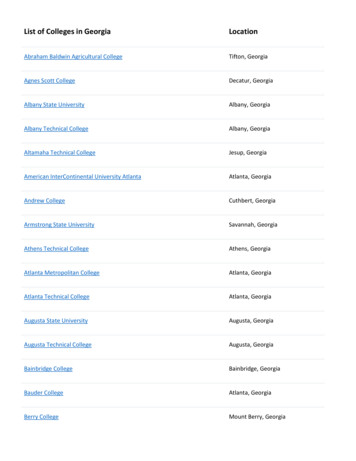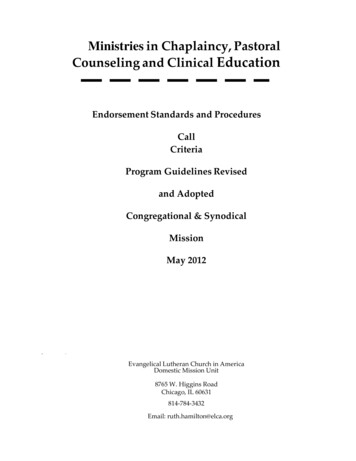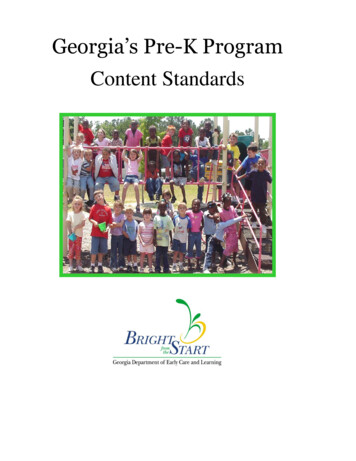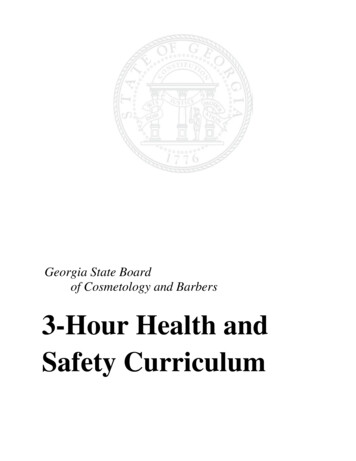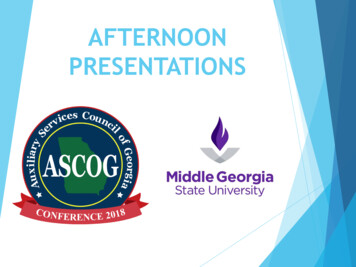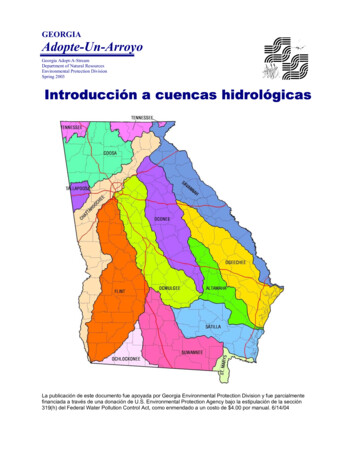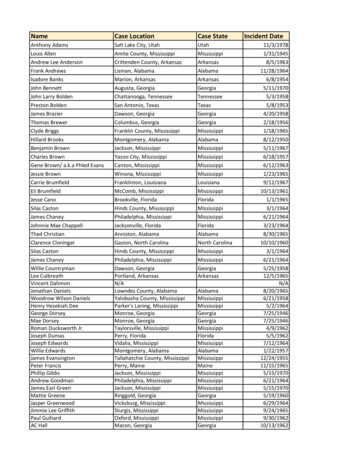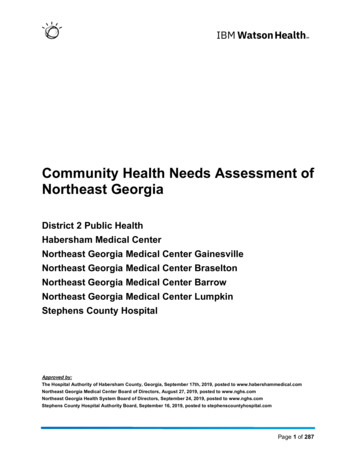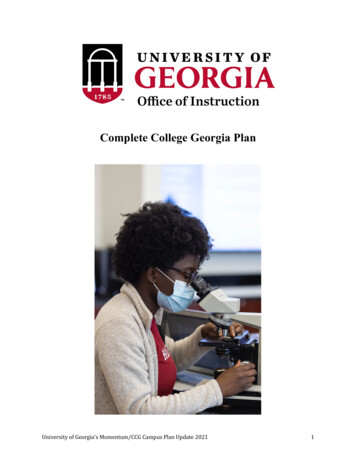
Transcription
INMATE SERVICES IMPACT REPORT 2020
IMPACTSERVICES REPORT MISSIONThe Georgia Department of Corrections protects the public by operating safe and securefacilities through the development of professional staff and effective offender management.VISIONWe set the exceptional standard for protecting the publicthrough our people, processes and infrastructure.CORE VALUESCourage Determination Teamwork05 REENTRY SERVICES AND COGNITIVE PROGRAMMINGResidential Substance Abuse Treatment ProgramMetro Reentry FacilityThe New Freedom ProgramReentry Assessment CentersRelease Document RepositoryCommunity Engagement InitiativePeach Pass Partnership11 STAFF AND PROGRAM DEVELOPMENT UNITInitial Correctional Counseling TrainingAddiction Certification Preparation ProgramCertified Clinical Supervisors TrainingSCRIBE Counselor EnhancementsProgram Development UnitOdyssey Program Development and ImplementationProgram Treatment Completion CertificateDomestic Violence Trauma Interventions CJCC GrantSpecial Management Unit Programming17 CHAPLAINCY SERVICESChaplaincy ServicesVolunteer Services21 ACADEMIC EDUCATIONAcademic Education EnrollmentCharter High School GraduatesOnline Approach to Academic EducationSpecial Populations ServedLibrary Services and Book Donations27 CAREER, TECHNICAL, AND HIGHER EDUCATIONCareer, Technical, and Higher Education CompletionsProgram CompletionsPost-Secondary ProgramsPartnershipsGEORGIA DEPARTMENT OF CORRECTIONS2Report designed by: Jessica Eanes
Letter From the CommissionerTIMOTHY C. WARD““Our Inmate Services teamcontinuously works to ensure thatthe GDC programs best meet theneeds of the inmate population.On behalf of the entire team at the Georgia Department of Corrections (GDC), it is withgreat pleasure that I present to you our Inmate Services Impact Report. Despite thechallenges of COVD-19 ending programming for the latter half of the fiscal year, staffwithin the GDC did not hesitate to modify their goals, objectives, and processes in aneffort to maintain our commitment to provide education, offender-based programming,and reentry services to assist offenders with returning to society as productive citizens.This report highlights our progress toward those goals and objectives.Over the last year, we have continually worked to set a successful inmate rehabilitation model. The agency has beendedicated to developing educational programs, job skills training, and evidence-based programs for offenders bycultivating partnerships with multiple agencies. Our Inmate Services team continuously works to ensure that the GDCprograms best meet the needs of the inmate population.Through our partnerships with the Technical College System of Georgia, we have been able to expand educationalprograms, thus providing offenders with new opportunities. Although Fiscal Year 2020 (FY 2020) became an untraditionalacademic year, staff and offenders worked hard to complete course work. Academic program completions for LiteracyRemedial Reading, Adult Basic Education, General Equivalency Diploma (GED) prep, GED testing, and Foothills EducationCharter High School reached over 6,000 completions. We were able to exceed a fiscal year goal of 20,000 earnedcertificates in Career, Technical, and Higher Education (CTHE) programs by more than 1,100.Reentry and Cognitive Programming provides evidence-based programming to offenders throughout the state. Programcompletions have steadily increased over the last three fiscal years, and in the FY 2020, the Unit had realized 60,700enrollments and 48,559 completions.The agency’s Reentry Assessment Centers (RAC) provide tools and support needed to assess, inform, prepare, andconnect returning citizens with a solid reentry plan during their final months of incarceration. The RAC offers resourcesfor housing, transportation, identification documents, and career exploration. During FY 2020, 300 new resources wereidentified, over 3,400 job leads were shared, and offenders were referred to more than 2,300 potential employers.GDC Chaplaincy Services continues to successfully in provide worship programs and pastoral counseling to offendersthroughout the state. The New Orleans Baptist Theological Seminary program, which was established at WhitworthWomen’s Facility in FY 2019, celebrated the completion of their first semester with female offenders working towardtheir two-year degree in Christian Ministry.I am proud to share the successes of our Inmate Services team during this unprecedented year, and I look forward toworking with our team in achieving even more success in the years to come.FISCAL YEAR 202033
IMPACT SERVICES REPORTAccording to the Rand Corporation and the Bureau of Justice Assistance (BJA) study, “How Effective is CorrectionalEducation, and Where Do We Go from Here?”, inmates who participate in any kind of educational program behindbars—from remedial math to vocational auto shop to college-level courses—are up to 43 percent less likely tore-offend and return to prison. They also appear to be far more likely to find a job after their release and the socialstability that comes with it, according to they study.Every dollar invested in correctional education saves nearly five in reincarceration costs over three years.TREATMENT EFFECTS FROM PROGRAMSThree-Year Felony Reconviction Rates for Program Completers vs. General PopulationBased on FY 2017 lProgramming29.02%ResidentialSubstance AbuseTreatment28.65%GeneralPopulationThree-year felony reconviction rates forinmates who have successfully completedGDC programming, versus the inmatepopulation who did not participate inprograms offered by GDC.GEORGIA DEPARTMENT OF CORRECTIONS420.17%VocationalProgramming
REENTRYSERVICES ANDCOGNITIVEPROGRAMMINGFISCAL YEAR 20205
IMPACT SERVICES REPORTRESIDENTIAL SUBSTANCE ABUSE TREATMENTThe Residential Substance Abuse Treatment (RSAT) program implements evidence-based programs which target crimeproducing behavior and focuses on changing criminal thinking and reducing actions associated with the criminal mindset.The mandated RSAT program is one of the largest in the country, with almost 2,500 beds. GDC partners with federal,state, and county agencies, non-profit and community-based organizations to provide research-based programs.RSAT Program Overview Evidenced based cognitive-behavioral curriculumRSAT Facilities Goal is to learn real-life ways to help live a pro-social,productive life free of alcohol, drugs, and crime All RSAT participants are housed separately from thegeneral population Based on Modified Therapeutic Community ModelBainbridge PSATC*Bleckley PSATC*Coastal State PrisonCoastal PSATC*Johnson RSAT (A)Johnson RSAT (B)Lee Arrendale State PrisonNorthwest RSATPaulding PSATC*Pulaski State PrisonTurner RSATValdosta State Prison*Probation Substance Abuse Treatment Center2,428Capacity2,828Enrolled9 MONTHS3,409 93%Program DurationCompletionsGEORGIA DEPARTMENT OF CORRECTIONS6Completion Rate
REENTRY SERVICES AND COGNITIVE PROGRAMMINGMETRO REENTRY FACILITYThe Metro Reentry Facility (RF) opened in May 2018 and utilizes comprehensive behavioral health and substance usecurriculum to address returning citizens’ criminogenic needs. All returning citizens within the program are classified ashigh-risk, high-need and receive a minimum of 20 hours of programming each week. The program is 12 months long andconsists of four levels that prepare the returning citizens for successful reentry into the community.Since May 1, 2018, there have been 281 releases fromMetro RF; the first occurring on May 21, 2018.Of the 281, no one that completed the full program hasbeen reconvicted, and only 17 that completed partialprogramming have been re-convicted.THE NEW FREEDOM PROGRAMThe New Freedom Program is offered at Metro Reentry Facility and consists of over 400 cognitive-behavioralprogramming hours. The program assists offenders by utilizing Motivational Interviewing (MI) and Cognitive BehavioralTherapy (CBT) techniques, group contact, goal setting, and emotional intelligence lessons. The program also increasesself-awareness and emotional recognition/regulation, awareness of current risk factors, and new protective factoroptions.The program concept is also designed to: identify what needs to be changed in the offender’s life test new ideas learn and practice new skills activate change and action planning for building self-efficacy create pro-social relationships for pre-release preparationDuring FY 2020, a total of 88 offenders have completed the New Freedom Program and were released. Of those, 39 werereleased directly from Metro RF, and at this point, none have been re-convicted.FISCAL YEAR 20207
IMPACT SERVICES REPORTREENTRY ASSESSMENT CENTERSLocated within Georgia’s prisons and Transitional Centers (TC), Reentry Assessment Centers (RAC) provide toolsand support needed to assess, inform, prepare, and connect the returning citizen with a solid plan of reentry whilecompleting their final months of incarceration. The redesign of these areas is aimed at better addressing all needs ofthe returning citizen. A new resource directory is being built and added for services to be researched by the countyof residence, thus saving time and making the RAC platform more user-friendly. By providing relevant and up-to-dateinformation and resources, peers guide and assist returning citizens in building a comprehensive reentry plan in thefollowing areas:IDENTIFICATION DOCUMENTS birth certificate social security card driver’s license identification cardsHOUSINGRESOURCESTRANSPORTATIONRESOURCESCAREER EXPLORATION TOOLS & ASSESSMENTS resume preparation practicing interviewing skills job market trends location of outside career centers job interest and skills matching assessments development of typing and computer skillsRELEASE DOCUMENT REPOSITORYThe repository provides a secure location for GDC to collect and store reentry-related documents such as Department ofDriver Services (DDS) identification cards, driver’s licenses, and birth certificates, which are vital to an inmates’ successupon release. The documents are sent to the releasing facility 180 days before the inmate’s release date.During FY 2020, the repository staff delivered 13,459 packets containing these documents to facilities to be given toinmates upon their release. Since the process began in 2016, more than 28,200 identification cards or driver’s licenseshave been issued.13,459Total Documents in FY 20205,0458,414Driver’s Licenses & ID CardsBirth CertificatesGEORGIA DEPARTMENT OF CORRECTIONS8
REENTRY SERVICES AND COGNITIVE PROGRAMMINGCOMMUNITY ENGAGEMENT INITIATIVEIn December of 2019, the Georgia Department of Corrections implemented a new initiative to identify resources thatfocused on offenders’ post-release needs. These resources covered employment, job skills training, housing, counselingservices, financial assistance for family and children, mentors, and faith-based organizations. From December of 2019 toJune 30, 2020, 498 new resources were identified.5518271HousingResourcesJob TrainingResourcesJob ReferralResources45Financial Support Resourcesfor Children and Faith Based andMentor Resources300 3,431new resources havebeen identifiedjob leads have beenshared with the field81job fairs have beenidentified (both virtuallyand in person) foroffenders to attend2,330offenders have beenreferred to employersACCOMPLISHMENTSSINCE DECEMBER 2019461offenders have been askedby employers for resumes,applications, or to applywhen they are releasedFISCAL YEAR 20209
IMPACT SERVICES REPORTPEACH PASS PARTNERSHIPThe GDC and the State Road and Tollway Authority (SRTA) entered into an agreement to provide employmentopportunities to returning citizens housed at Metro TC. The program was implemented in November 2018 and focuseson image review for the Peach Pass Lanes.During FY 2020, the program employed 10 returning citizens and reviewed almost two million images. A similarpartnership will be implemented at Metro Reentry Facility (RF) during FY 2021; however, offenders participating at MetroRF will earn vocational credits towards certification.Total Images Reviewed Per 000100,00050,0000JulyAugustSeptemberOctoberGEORGIA DEPARTMENT OF CORRECTIONS10NovemberDecemberJanuaryFebruaryMarch
STAFF ANDPROGRAMDEVELOPMENTUNITFISCAL YEAR 202011
IMPACT SERVICES REPORTINITIAL CORRECTIONAL COUNSELING TRAININGInitial Correctional Counseling Training (ICCT) is a seven-day comprehensive training program designed to introduce andprovide entry-level counselors and Multi-Functional Officers (MFO) with the necessary knowledge and skills to provideservices to the inmate population. During FY 2020, newly hired counselors and MFOs completed this required training,within 12 months of their hire date.Cognitive Behavioral Program80,00091%of goal met70,00060,00083%of goal met60,70055,01050,000Numberof inmatesenrolled incognitiveprogrammingdue to rof inmatescompletingan identifiedneeds basedcognitiveprogram.10,0000Enrollment GoalActual EnrollmentsGEORGIA DEPARTMENT OF CORRECTIONS12Completions GoalActual Completions
STAFF AND PROGRAM DEVELOPMENT UNIT38AUDITSSocial Service Program Consultants attend all facility audits. These audits are of theCare and Treatment and Performance Incentive Credit section. During the audits,facilities are scored based on how well they are following policies and directives576In addition to facility audits, routine site visits are conducted to support and providerecommendations regarding care and treatment operations. During these site visits,the consultants review offender programming, case notes, classification, staffing,FACILITY SITE monthly meetings, and supervisory oversight of the counselors. The site visits helpVISITS the facilities maintain policy compliance throughout the year.ADDICTION CERTIFICATION PREPARATION PROGRAMThe Addiction Certification Preparation Program (ACPP) was created to identify, train, and develop staff into certifiedaddiction counselors. This intensive 12-month program provides participants with the educational hours requiredfor certification. When graduates pass the exam, they become Certified Alcohol and Drug Counselors through theInternational Certification and Reciprocity Consortium. During FY 2020, 17 GDC counselors attended the mplete 300 education hours required by state certification boardsHave a minimum of 4,000 hours of work experiencePass a 150 question examComplete 200 hours of clinical supervisionFISCAL YEAR 202013
IMPACT SERVICES REPORTCERTIFIED CLINICAL SUPERVISORS TRAININGIn FY 2020, four GDC staff undertook the rigorous process of becoming Certified Clinical Supervisors. The certificationprocess requires five years of full-time experience as an addiction counselor; two years of full-time experience as asupervisor; 200 hours of clinical supervision; 30 hours of education, and a passing score on a 150-question exam. Allfour staff passed the exam and now hold international certifications through the International Certification & ReciprocityConsortium.Five yearsof full-timeexperience asan addictioncounselorTwo yearsof full-timeexperience as asupervisor200 hoursof clinicalsupervision30 hours ofeducationPassing score ona 150 questionexamSCRIBE COUNSELOR ENHANCEMENTSTo assist counselors with the documentation of 90-day meaningful contact case notes and ensure policy guidelines aremet, enhancements were made to GDC’s internal offener case management software, Statewide Correctional Repositoryand Information System (SCRIBE). One enhancement will support the proper documentation of a meaningful contactusing a DAP (Data, Assessment, Plan) format. The Office of Information Technology created dialogue boxes that willdefine each part of the note captured in DAP format, which will serve as a guide for the counselor.The other enhancements will assist with meeting the 90-day meaningful contact requirement. A new column on thecase manager caseload screen will indicate when the next 90-day contact is due. It will also alert the counselor whenthe contact is late. The use of the available information in SCRIBE will save valuable time, meet deadlines, and aid chiefcounselors with their caseload reviews. Deployment of these enhancements is slated for September 2020.PROGRAM DEVELOPMENT UNITThe Program Development Unit conducts continuous examinations of research literature for evidence-based practicedevelopments and improvements for consideration, as well as maintaining, training, and developing policy for thedepartment’s offender risk and need assessment process. They also develop and conduct internal and external processand outcome evaluations to determine the effectiveness of GDC processes and programs intended to reduce recidivism.GEORGIA DEPARTMENT OF CORRECTIONS14
STAFF AND PROGRAM DEVELOPMENT UNITODYSSEY PROGRAM DEVELOPMENT AND IMPLEMENTATIONThe Odyssey Program focuses on teaching relevant life skills needed for Transitional Center (TC) residents to transitionback to their communities successfully. The program was developed and implemented for TC in 2019.13ProcessAction TeamMeetingsConducted95TC StaffMembersTrained2,345TCResidentsCompleted57% increase from 1001 in FY 2019DOMESTIC VIOLENCE TRAUMA INTERVENTIONS CJCC GRANTThe purpose of this project is to provide research-based, trauma-informed programming to more than 100 femalereturning citizens housed at Lee Arrendale State Prison and Lee Arrendale Transitional Center, who have been impactedby domestic violence, and will be released to the local community. The Trauma-informed training will also be providedto identified staff at these facilities. The grant is in partnership with Circle of Hope, a non-profit domestic violenceorganization funded by the Criminal Justice Coordinating Council (CJCC). Planning began in September 2019, withimplementation anticipated in the fall of 2020.SPECIAL MANAGEMENT UNIT (SMU)During FY 2020, the Office of Reentry Services implemented additional programming at the SMU. They offered initialmotivational interviewing skills to SMU staff and also provided Franklin Coveys’ “7 Habits of Highly Effective People” andthe Great Courses as instructional materials for the offenders.SMU developed a master calendar to provide a list of program activities that the facility implemented to support theoffender population. The master calendar includes programming and activities for use during recreation time, table time,education, groups, visitation, and video learning.FISCAL YEAR 202015
IMPACT SERVICES REPORTPROGRAM TREATMENT COMPLETION CERTIFICATEThe Program and Treatment Completion Certificate (PTCC) is a reentry tool issued to inmates who meet the establishedcriteria. This certificate provides the inmates with a historical account of the accomplishments/programs they havecompleted while incarcerated. Upon their release, inmates are able to use the PTCC as a tool to highlight theirprogramming accomplishments during their incarceration.FY 20209,841FY 20198,846FY 20187,686FY 20176,122FY 20164,854244FY 201502,0004,0006,0008,00010,000*Per OCGA 42-2-5.2(c) – Not all inmates released are eligible to have a Program Treatment Completion Certificate awarded to them. An inmatewho was convicted of a serious violent felony, as such term is defined in Code Section 17-10-6.1, is not eligible for a PTCC.GEORGIA DEPARTMENT OF CORRECTIONS16
CHAPLAINCY & VOLUNTEER SERVICESCHAPLAINCYSERVICESFISCAL YEAR 202017
IMPACT SERVICES REPORTCHAPLAINCY SERVICESThe mission of the GDC Chaplaincy Services is to provide and facilitate access to pastoral care for inmates andstaff to promote and establish a community of peace, hope, safety, and mutual respect, and ensure inmates’First Amendment religious rights. Chaplaincy Services support the agency’s mission and vision throughprofessional leadership, and by providing pastoral care to inmates and staff on an individual and corporatebasis.FY 2020 Chaplaincy Services ant577CatholicSince the inception of the New Orleans Baptist Theological Seminary (NOBTS) on January 15, 2019, 12 femaleinmates have completed the first year at Whitworth Women’s Facility. Funding for the program is providedby Heartbound Ministries. The fully accredited college degree is designed to provide a broad foundation forministry within the prison system and is based upon eight core competencies: Biblical Exposition, ChristianHeritage, Servant Leadership, Interpersonal Relationships, Spiritual and Character Formation, Disciple Making,Worship Leadership and Life Skills. They are now completing the third and fourth semester, with graduationscheduled for May 2021.GEORGIA DEPARTMENT OF CORRECTIONS18
VOLUNTEER SERVICESVOLUNTEER SERVICESVolunteer Services incorporates religious and secular activities through community stakeholders, concerned citizens, civicorganizations, and business partnerships that support services offered, and others not provided, to inmates by traditionalagency programming. The goal for Volunteer Services is to educate the community on how to best support inmates asthey transition back into their lives post-release.Volunteer Services has over 7,000 trained volunteers to assist the inmates and returning citizens inside and outsidecorrectional facilities statewide.Volunteer Services has implemented new and creative processes in the way volunteersare “onboarded” to make their experience more user-friendly and convenient. Website Improvements Standardized Training Developed Training Curriculum Updated Standard Operating Procedures- Data Collection- Documentation- Information Sharing Identifying Staffing Needs- Oversight and Accountability Developed an Implementation PlanFISCAL YEAR 202019
IMPACT SERVICES REPORT1,249Volunteers trained at 21training events during FY 20202,415Monthly volunteersacross the state5,654Inmates attend weeklyvolunteer services24,507Inmates attend monthlyservices on an average basis*Cumulative totals - an individual may have attendedservice more than once in the same monthGEORGIA DEPARTMENT OF CORRECTIONS20
ACADEMICEDUCATIONFISCAL YEAR 202021
IMPACT SERVICES REPORTACADEMIC EDUCATIONCOVID-19 caused the closure of over 200 school districts across Georgia, effectively ending the school yearfor many students. Inmates enrolled in academic education classes were also affected by the closure, onlycompleting two-thirds of the fiscal year in a traditional classroom setting with a qualified instructor. Datacollection and analysis indicate that GDC’s academic education programming was on track to meet and exceedthe FY 2020 goals.Offenders in GDC academic classes are placed according to ability and achievement level. Students canprogress through Literacy/Remedial Reading, Adult Basic Education, GED Preparation, GED Testing, and/orCharter School. Total completions during the first eight months of FY 2020 were 6,024. During the 12 monthsacademic courses were held in FY 2019, there were 9,576 completions, indicating similar completion rates.Traditionally, GDC completions are higher in the last four months of the fiscal year.High School Equivalency Diplomas (HSED)3,500DiplomaTotal: 3,118Total: 3,0223,000Diploma: 101HSED: 3,0172,500Diploma: 87HSED: 2,935HSEDTotal: 2,426Diploma: 55HSED: 2,3712,000Total: 1,818Diploma: 19HSED: 1,7991,500Total: 1,262Diploma: 38HSED: 1,2241,000500Total: 491Diploma: 19HSED: 4720FY 2015FY 2016FY 2017High School Equivalent Diploma (HSED)FY 2018FY 2019FY 2020DiplomaThere were 1,799 HSEDs earned in the first eight months of FY 2020. These completions placed GDC studentsat 60% of the annual goal of 3,000. In comparison for this same period in FY 2019, GDC students had earned1,840 HSED credentials or 61% of the annual goal of 3,000.GEORGIA DEPARTMENT OF CORRECTIONS22
ACADEMIC EDUCATIONAcademic Completions by ProgramCCIPrivate PrisonPDCRSATState Prison TCTotal543527310944024974411,063451,533GED Prep 1192161301281,586562,235GED Testing ,026Literacy/Remedial Reading 5Adult Basic Education 61Charter School 0Total 344 10000County Correctional Institution (CCI)Probation Detention Center (PDC)Residential Substance Abuse Treatment Center (RSAT)Transitional Center (TC)83Lifer HSED CompletionsThere were 83 lifersreceiving a HSEDcredential in FY 2020.Academic Completions by Year9,6239,6658,731800060006,0265,2154000HSED CompletionsGeorgia Diagnostic andClassification Prisoncredentialed 128inmates during an eight month period, meeting98.46% of their goal forthe year.20000128FY 2016FY 2017FY 2018FY 2019FY 2020FISCAL YEAR 202023
IMPACT SERVICES REPORTACADEMIC EDUCATION ENROLLMENTDuring FY 2020, GDC education recorded 16,277 enrollments in academic courses. The average monthlyenrollment was approximately 6,300.Top Eight Facilities Earning Over 50 HSEDs in FY 2020Georgia Diagnostic and Classification Prison128Coastal State Prison82Coffee Correctional Facility76Whitworth Women’s Facility72Wheeler Correctional Facility58Emanuel Women’s Facility54Calhoun State Prison51Riverbend Correctional Facility51100%Facilities earningof their annual HSED goalsin eight monthsAtlanta TCAthens-Clarke CCICoastal SPDecatur CCIEmanuel PDCEmanuel Women’s FacilityFloyd CCIMcEver PDCPatten PDCRichmond CCIWalker SPWomen’s PDCThirty correctional facilities were on track to meet and exceed theirHSED goals for the fiscal year at the end of the eight-month period.This is an increase from the 25 facilities that were on track to meetand exceed their HSED goals for the same time period in FY 2019.GEORGIA DEPARTMENT OF CORRECTIONS24
ACADEMIC EDUCATIONCHARTER HIGH SCHOOL GRADUATESA total of 319 high school diplomas have been awarded since the inception of the charter school program.Foothills Education Charter High School operates charter school sites at three correctional facilities within GDC:Burruss Correctional Training Center, Lee Arrendale State Prison, and Phillips State Prison.12010010187806055403820190FY 201519FY 2016FY 2017FY 2018FY 2019FY 2020ONLINE APPROACH TO ACADEMIC EDUCATIONDuring the four months that academic education and testing was halted in correctional facilities, GDCeducation staff met weekly to: Engage in data analysis for individual facilities and regionsCreate individualized plans for targeting instruction within correctional facilitiesEstablish goals for FY 2021Develop and implement a standards mastery checklist that would allow instructors to triangulate data topromote studentsCompile and share a curriculum repository for lesson plans and activities that could be used in theclassroom and through distance learning while inmates were confined to dorms.FISCAL YEAR 202025
IMPACT SERVICES REPORTSPECIAL POPULATIONS SERVEDTitle I-D Neglected, and Delinquent youth are classified as students aged 17-21 who are incarcerated. GDC works inconjunction with the Georgia Department of Education to ensure that students who are eligible for Special Educationand/or Neglected and Delinquent Youth Services are served, per federal mandate.1,6534245026Special PopulationStudents ServedJuveniles enrolled andserved in academic educationEarned a HSEDEarned a HSEDGDC education staff provided additional training for instructors to offer services for Neglected and Delinquentyouth under Title I-D. Specific training on meeting the instructional needs of this target group was provided at theAnnual Education Conference in August 2019 and through on-going facility site visits throughout the year to evaluateimplementation.LIBRARY SERVICES AND BOOK DONATIONS62,000books were donated to correctionalfacilities during FY 2020GDC Library Services implemented an improvedprocess to accept book donations from communitymembers and organizations, increasing the numberof books received for distribution within correctionallibraries by 313%, or a total of 62,000 books receivedduring FY 2020. GDC Library Services has received atotal of 77,000 book donations since May 2019 andprocesses these books through security protocol atGDC’s book repository.Through a partnership with the Georgia Public LibrarySystem, GDC increased the number of interlibraryloans by 50%, increasing from 1,000 books loaned frompublic libraries to inmates within Georgia’s correctionalfacilities to over 1,500.GEORGIA DEPARTMENT OF CORRECTIONS26
ACADEMIC EDUCATIONCAREER,TECHNICAL, ANDHIGHER EDUCATIONFISCAL YEAR 202027
IMPACT SERVICES REPORTCAREER, TECHNICAL, AND HIGHER EDUCATION COMPLETIONSOffenders earned over 20,000 successful Career, Technical, and Higher Education (CTHE) completions duringFiscal Year 2020. The combined efforts of partner agencies, instructors, counselors, on-the-job (OJT) trainingcoordinators, correctional officers, and many others made this milestone possible.Three facilities earned over 1,000 completions Coastal State Prison: 1,645 Coffee Correctional Facility: 1,302 Montgomery State Prison: 1,068317% growthin successful completions since FY 2017187% increasein average monthly enrollments over the last two yearsCTHE Enrollments and 14418,49718,65915,00012,20110,0009,8906,0905,000FY 2017EnrollmentFY 2018CompletionsGEORGIA DEPARTMENT OF CORRECTIONS28FY 2019FY 2020
CAREER, TECHNICAL, AND HIGHER EDUCATIONCTHE Completion Breakdowns25,000Total: 21,1442,46420,000Total: 18,6597065,9086,09615,0003,689Total: 10,16010,0004,3491,5735,000Total: 3,291Total: 2,529952*FY 2015*FY 20162,7482,1711,6381,6531,5779,5138,356Total: 6,09003,0713,0632,346FY 2017OJTSkills/TradesVocationalPost-SecondaryFY 2018FY 2019FY 2020*In FY 2015 and 2016, Skills/Trades were included in the Vocational category.FISCAL YEAR 202029
IM
The Residential Substance Abuse Treatment (RSAT) program implements evidence-based programs which target crime producing behavior and focuses on changing criminal thinking and reducing actions associated with the criminal mindset. The mandated RSAT program is one of the largest in the country, with almost 2,500 beds. GDC partners with federal,
